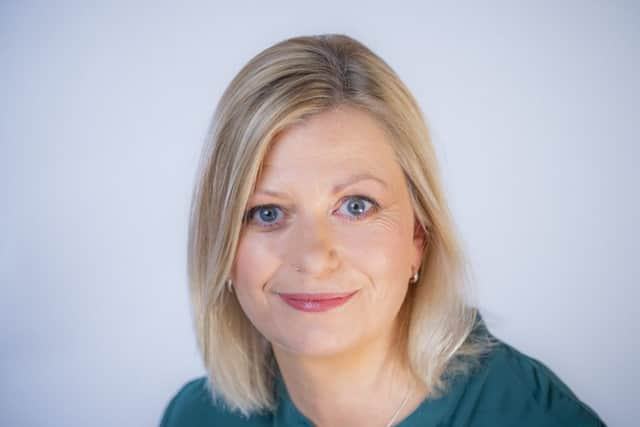BBC Scotland editor rejects anti-independence bias claim
Hayley Valentine, who previously worked on Question Time and other debates in the run-up to the referendum in 2014, said she did not know “a single journalist who brought any bias to work with them”.
Valentine, who has spent more than a year preparing for the launch of The Nine, which will broadcast for the first time tomorrow, said she was aware that BBC Scotland had “trust issues” in the wake of its referendum coverage, but said these were “overplayed” by critics of the broadcaster.
Advertisement
Hide AdAdvertisement
Hide AdValentine said she hoped The Nine would restore faith in BBC Scotland by shunning “top-down journalism”, reducing the use of jargon and “making people feel we are for them and of them”.


She said a key aim of The Nine was to move political journalism “away from institutions” and translate politics into how it affects ordinary people.
Valentine worked as executive editor and executive producer of Question Time before being appointed editor of The Nine in November 2017 - seven months after the new channel and the news hour programme were announced.
Valentine said: “I was involved in our referendum programming. I will defend it to accusations of bias until my dying day.
“I’m not saying the BBC or any other broadcaster was perfect. It was a tricky time, but we were all doing the best we could. I don’t know a single journalist who brought any bias to work with them.
Opinion polling carried out in the wake of the referendum has found that viewers in Scotland were more unhappy about the BBC’s output than any other part of the media.
One survey found that a third of audiences in Scotland believed that the BBC was biased against independence.
Advertisement
Hide AdAdvertisement
Hide AdValentine, a former head of news at BBC Radio 5 Live, said: “I’m aware that there are trust issues, but I think they are sometimes overplayed. The BBC is still trusted, and BBC Scotland is still trusted, more than most news organisations.
“I don’t think we are universally dismissed on a trust basis. Across the piece, the public looks at lot more sceptically at journalism than it potentially did ten years ago.
“To be trusted, you have to give people things that they want and have a need for, and stories that they wouldn’t otherwise be told. Our remit is to serve the audience better, ask questions that people want asked, explore bits of Scottish life that aren’t currently being explored and reflect their lives back at that them. That will get people to like and trust our programme. It can do a lot to make people feel that we are for them and of them.”
The BBC has faced regular demands to overhaul its coverage of Scottish news and current affairs since the creation of the Scottish Parliament in 1999, including the idea of a “Scottish Six” version of the UK network news.
First Minister Nicola Sturgeon proposed a dedicated channel in a keynote speech to the Edinburgh TV Festival in 2015 following widespread criticism of the corporation’s referendum coverage.
The BBC announced the creation of a dedicated Scottish news hour programme in February 2017, when the new channel was confirmed, complete with a £32 million budget, which has helped pay for 80 new journalists to be hired in the run-up to the launch of The Nine.
New appointments include James Cook, the BBC’s former North America correspondent, as chief news correspondent, innnovation correspondent Laura Goodwin, David Farrell as entertainment reporter, A Europe corrrespondent, Jean MacKenzie, and three new poitical reporters - Rajdeep Sandhu, Lynsey Bews and David Lockhart.
Advertisement
Hide AdAdvertisement
Hide AdValentine, who started her journalism career in newspapers in Dundee after studying literature at Edinburgh University, admitted she had been drawn to the challenge of working on a “huge blank canvas” to plan the programme.
She added: “To some extent this programme has been in the offing for 20 years. Part of me thought: ‘why would you not want to be involved with this?’ It was a huge opportunity.
“Putting the programme out at 9pm on a new channel gives it more of an opportunity than the old debate around a Scottish Six would have provided.
“When do you get to start things from scratch? Launching things is rare in television journalism. We’ve had the opportunity recruit a large number of people and actually shape the programme around them.
“I want the programme to feel more normal and of the people. The channel wants to be people-focused and we want to be people-focused.
“There is a brand of top-down journalism where a head of an institution tells people this, and another institution responds or tells you what to think.
“Experts absolutely have a place in this programme and so do politicians. But people want to see themselves and how stories affect them on screen so they can connect with them better. We have to have people affected by stories at the heart of the programme.
Advertisement
Hide AdAdvertisement
Hide Ad“One of the easy ways to do that is by hiring people who feel more closely related to the audience.
“The BBC is probably known a bit for people being a quite posh, middle class, highly educated and all the rest of it. I’ve hired a real mix of people from a real mix of backgrounds. I’ve tried to be more diverse.”